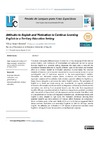Please use this identifier to cite or link to this item:
https://accedacris.ulpgc.es/jspui/handle/10553/70401
| DC Field | Value | Language |
|---|---|---|
| dc.contributor.author | Borenić, Višnja Kabalin | en_US |
| dc.date.accessioned | 2020-02-20T08:43:16Z | - |
| dc.date.available | 2020-02-20T08:43:16Z | - |
| dc.date.issued | 2019 | en_US |
| dc.identifier.issn | 1133-1127 | en_US |
| dc.identifier.uri | https://accedacris.ulpgc.es/handle/10553/70401 | - |
| dc.description.abstract | This study investigates attitudes toward English, the primary language of international communication, and motivation of intermediate and advanced learners to pursue Business English in a university setting. Moreover, the study aims to establish the correlations between attitudes to English, different types of motivation and invested effort as a criterion related to motivated behaviour. Approximately 700 Croatian students of business and economics responded to a questionnaire based on earlier sociolinguistic and L2 motivation research in the socio-psychological tradition. Descriptive and inferential analyses (factor, correlation and hierarchical multiple regression analyses) of the collected data revealed a positive attitude to English as a lingua franca alongside a preference for native English varieties. The perception of English as a threat was weak among our respondents. As regards motivational dimensions, the sample was characterised by integrative and two types of instrumental motivation, one deriving from expected benefits and the other from experienced benefits. Although a positive attitude to English as a lingua franca positively correlated with invested effort, hierarchical multiple regression analysis revealed that effort could only be predicted on the basis of integrative motivation and positive experiences with English to date. Despite its high score, the motivation dimension deriving from expected benefits was not a predictor of invested effort. Moreover, its composition (focus on future goals, milieu and vitality of L2 community items) suggested that it reflects extrinsic motivation and resembles Ought-to L2 Self. Our findings provide insights into attitudes and motivation of ESP learners in educational contexts where English is not regularly used for academic and professional purposes. | en_US |
| dc.description.abstract | Este estudio investiga las actitudes hacia el inglés, el idioma principal de la comunicación internacional, y la motivación de los estudiantes intermedios y avanzados para estudiar inglés de negocios en un entorno universitario. Además, el estudio pretende establecer las correlaciones entre las actitudes hacia el inglés, los diferentes tipos de motivación y el esfuerzo invertido como uno de los criterios relacionados con el comportamiento motivado. Aproximadamente 700 estudiantes croatas de negocios y economía respondieron a un cuestionario basado en investigaciones sociolingüísticas y de motivación en L2 previas, conducidas en la tradición socio-psicológica. Los análisis descriptivos e inferenciales (factorial, de correlación y de regresión múltiple jerárquica) de los datos recopilados revelaron una actitud positiva hacia el inglés como lingua franca junto con una preferencia por las variedades nativas de inglés. La percepción del inglés como una amenaza fue débil entre los encuestados. En cuanto a las dimensiones motivacionales, la muestra se caracterizó por una motivación integrativa y dos tipos de motivación instrumental, una derivada de los beneficios esperados y otra de los beneficios experimentados. Aunque la actitud positiva hacia el inglés como lingua franca correlacionó positivamente con el esfuerzo invertido, el análisis de regresión jerárquica múltiple reveló que el esfuerzo solamente podía predecirse a base de la motivación integradora y las experiencias positivas con el inglés hasta la fecha. A pesar de su alta puntuación, la dimensión de motivación derivada de los beneficios esperados no fue un factor predictivo del esfuerzo invertido. Además, su composición (centrada en los objetivos futuros, el entorno y la vitalidad de los elementos de la comunidad de L2) sugiere que refleja una motivación extrínseca y se asemeja al yo deóntico L2 (Ought-to L2 self). Nuestros hallazgos proporcionan información sobre las actitudes y la motivación de los estudiantes de inglés con fines específicos en contextos educativos donde el inglés no se usa regularmente con fines académicos y profesionales. | en_US |
| dc.language | eng | en_US |
| dc.relation.ispartof | LFE. Revista de Lenguas para Fines Específicos | en_US |
| dc.source | LFE. Revista de lenguas para fines específicos [eISSN 2340-8561], v. 25 (1), p. 9-27 | en_US |
| dc.subject | 570107 Lengua y literatura | en_US |
| dc.subject | 550510 Filología | en_US |
| dc.subject.other | Language attitudes | en_US |
| dc.subject.other | Motivation | en_US |
| dc.subject.other | ESP | en_US |
| dc.subject.other | Globalization/ internationalization | en_US |
| dc.subject.other | Tertiary education | en_US |
| dc.subject.other | Actitudes | en_US |
| dc.subject.other | Motivación | en_US |
| dc.subject.other | Inglés para fines específicos | en_US |
| dc.subject.other | Globalización/ internaciolización | en_US |
| dc.subject.other | Educación terciaria | en_US |
| dc.title | Attitudes to English and motivation to continue learning English in a tertiary education setting | en_US |
| dc.type | info:eu-repo/semantics/article | en_US |
| dc.type | Article | en_US |
| dc.identifier.doi | 10.20420/rlfe.2019.247 | en_US |
| dc.investigacion | Artes y Humanidades | en_US |
| dc.type2 | Artículo | en_US |
| dc.identifier.ulpgc | Sí | es |
| dc.description.esci | ESCI | |
| dc.description.dialnetimpact | 0,0 | |
| dc.description.dialnetq | Q1 | |
| dc.description.dialnetd | D2 | |
| dc.description.erihplus | ERIH PLUS | |
| item.grantfulltext | open | - |
| item.fulltext | Con texto completo | - |
| Appears in Collections: | Artículos | |
WEB OF SCIENCETM
Citations
2
checked on Feb 8, 2026
Page view(s)
11
checked on Jan 10, 2026
Download(s)
4
checked on Jan 10, 2026
Google ScholarTM
Check
Altmetric
Share
Export metadata
Items in accedaCRIS are protected by copyright, with all rights reserved, unless otherwise indicated.
